
BLOG
To Become a Stronger Storyteller, Don't Write. Explore.
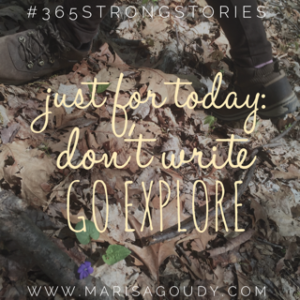 Sometimes the best way to strengthen your storytelling and feed your writing practice is to take a time away from the page.
When my husband asks me what I want for Mother's Day, "time to myself" is always near the top of the list. I was looking forward to an hour with my journal to write and mourn my mom and follow a thought from beginning to end without having to play referee or ask anyone if they needed to use the potty.
Sometimes the best way to strengthen your storytelling and feed your writing practice is to take a time away from the page.
When my husband asks me what I want for Mother's Day, "time to myself" is always near the top of the list. I was looking forward to an hour with my journal to write and mourn my mom and follow a thought from beginning to end without having to play referee or ask anyone if they needed to use the potty.
But then, as he started to pack everyone in the car, it became clear that I needed to savor an even rarer pleasure - time alone with my older daughter.
As a rule, she asks for more of my focused attention than I could ever provide. Today, however, as we explored the acres of awakening woods behind our house, just the two of us, we met unfathomable abundance. Amidst the unfurling ferns, the scattering of wild strawberries, and the countless fairy dens, I could give her all she asked for and more.
Was it the magic of the date on the calendar, when the ubiquitous celebration of mother love made me a better mama than usual? Can I think Nature's May display of infinite enoughness? Was it simply that my relationship with my daughter makes sense when we have time and space enough to hold it?
On Sundays, the #365StrongStories project is devoted to offering up a writing prompt. This week, I invite you to take part in a BEING prompt.
Go out and explore. Break a writing date with yourself and wander with eyes wide open. Say "yes" and spread your arms wide to the unexpected. When it's time, come back to the pen or keyboard and start something new.
Use the Story Triangle to Tell Stories that Work
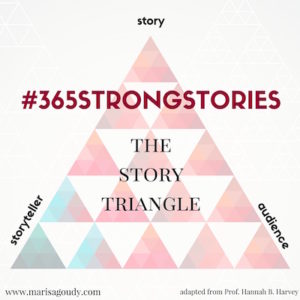 In some forgotten magazine, I once read a lament about how little fiction is written about the world of work.
When historians look back upon this time they might think we live in an age of passionate romance, of hideous crimes, of sweeping wars, and occasional zombie plagues and vampire infestations. They won't be able to look to that cultural signifier we call the novel to understand how many bloody hours we devote to emails and preparing reports and fiddling with "easy" tools like the LeadPages system.
In some forgotten magazine, I once read a lament about how little fiction is written about the world of work.
When historians look back upon this time they might think we live in an age of passionate romance, of hideous crimes, of sweeping wars, and occasional zombie plagues and vampire infestations. They won't be able to look to that cultural signifier we call the novel to understand how many bloody hours we devote to emails and preparing reports and fiddling with "easy" tools like the LeadPages system.
That said, these people from the future might be able to go to server farms to comb through our Gmail accounts to understand our daily preoccupations, but what will they really understand of our everyday lives by looking at all those alerts and notifications we skillfully dismiss and ignore?
I'm hustling through the completion of a major project. Ironically, though it's all about storytelling, I find that I'm having trouble living my own story through the haze of "busy." That's what happens when you hunch over a laptop perfecting copy and worrying over image selection and praying that all the intangible tech pieces will place nicely with one another.
Even though all this minutiae isn't in itself the stuff that legends are made of, the stories that I am empowering others to craft do have infinite potential. They can mean something to the storytellers and the audiences they're made for.
The everyday tasks of running an online business don’t lend themselves to become great stories. In my case, however, I hope that my own stretch of "mundane" work will empower you to tell stories that matter.
Join me for the next free Story Triangle class that is coming up on May 24. Who knows? The storytelling tools you learn to deepen your connection with clients might enable you tell the great story of what it means to run a business in the 21st century! Reserve your seat
Writing Prompt: Write Your Way Home
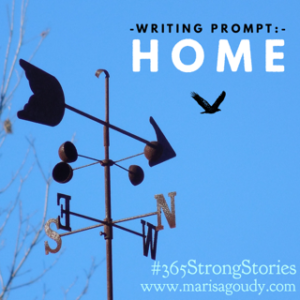 What does "home" conjure for you? Simply free writing on a page beneath that word written in broad capital letters is a potent writing exercise in itself.
Today, I drove through a piece of my hometown, eyes welling up at my closest childhood friend's driveway, at the stretch of sidewalk where I fell off my bike and nearly got run over, at the restaurant where I slogged through the worst summer job ever.
What does "home" conjure for you? Simply free writing on a page beneath that word written in broad capital letters is a potent writing exercise in itself.
Today, I drove through a piece of my hometown, eyes welling up at my closest childhood friend's driveway, at the stretch of sidewalk where I fell off my bike and nearly got run over, at the restaurant where I slogged through the worst summer job ever.
Gleefully, I told my daughter about the forest where I met the fairies for the first time in my adult life (they were happy to have me back). I did not point out my high school boyfriend's house or mention the church we thought we'd get married in some day.
I don't have a bed in this town anymore. My dad has moved four towns further out on the peninsula that held me from my first breath. Luckily, Cape Cod has great wide arms to welcome me "home," no matter what beach I land on. This piece of historic Route 6A in Barnstable will always lead the way home even if I have no fixed address along the way.
Now that I have survived the five-hour trip across Massachusetts and dipped down into our "real" home in New York's Hudson Valley, I can almost leave the tears behind. I can almost find the creative spark that hides amongst the yearning and the memories.
Gratefully, I can turn to one of the great mothers of American literature for three views through the prism of home. All true, all compelling, all addressing a different aspect of the complicated subject of home:
- "You can never go home again, but the truth is you can never leave home, so it’s all right."
- "The ache for home lives in all of us, the safe place where we can go as we are and not be questioned."
- "I long, as does every human being, to be at home wherever I find myself."
Your turn... write into that simply stated "home" or use one of the quotes as inspiration. Consider submitting your story to the #365StrongStories project.
Your Next Story Is Hiding In Your Favorite Little Details
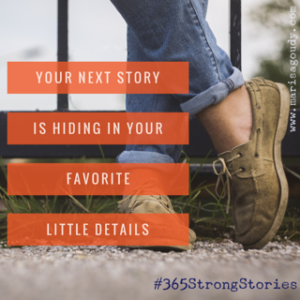 Some people remember exactly what everyone ordered during that special meal. Others have a vivid recall for the phase of the moon on an important day.
Personally, I have fashion memory. I can tell you exactly what I wore from head to toe the night I met my husband. (And yes, I still wear that denim jacket twelve years later.)
Some people remember exactly what everyone ordered during that special meal. Others have a vivid recall for the phase of the moon on an important day.
Personally, I have fashion memory. I can tell you exactly what I wore from head to toe the night I met my husband. (And yes, I still wear that denim jacket twelve years later.)
The shoes I wore to my unexpected date with destiny just hit the bottom of the trash can, however. During the last big rain I realized that the cosmetic issues on the soles were in fact structural deficiencies. Turns life is too short to wear leaky shoes - even if they do have great sentimental value.
The details make the stories
What little things do you tend to notice? Those observations form your unique point of view. They allow you to tell the authentic story that only you could tell.
My husband wouldn’t remember my outfit and he certainly wouldn’t remember what he’d worn himself. But now, the story of how that redhead at the end of the crowded bar in New Paltz knew there was something about that guy with the sweet smile - even though he wore a tie-dyed Harley Davidson shirt, tapered legged jeans, and boat shoes - that’s essential to the “how Mike and Marisa met” legend.
Your favorite details also inspire your stories
The details that are special to you can also help you decide which stories to tell.
Though my first date shoes are long gone by now, I was reminded of them when I tripped over another pair of sneakers that have been sitting in middle of the hall for much too long. If “the clothes make the man” is true, then apparently “the shoes make the memories” is valid too.
What little details stand out to you? How can you make a practice of noticing these details and put them to work in the stories you write?
How to Write a Strong Story When You Feel Less Than Strong
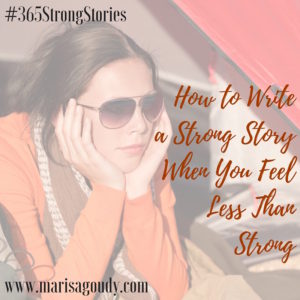 Making blogging, newsletter, and other content marketing details when you're sick, stressed, or sad... It's one of the toughest parts of running a practice or a small business because, let's be honest, you're pretty much always writing this week's material just days or hours before it goes live.
What happens when life or your mood gets in the way of getting yourself in front of your audience?
Making blogging, newsletter, and other content marketing details when you're sick, stressed, or sad... It's one of the toughest parts of running a practice or a small business because, let's be honest, you're pretty much always writing this week's material just days or hours before it goes live.
What happens when life or your mood gets in the way of getting yourself in front of your audience?
First, ask yourself: MUST I get this written today?
That depends on several factors, so go deeper and ask yourself a few more questions.
Are these self-imposed deadlines or did you promise a guest post or something that is going to print?
When another site or publication is waiting on you, writing becomes a job you simply need to do. I suggest you set a time, sit down in that chair, and put words on the page. Call in a friend or an editor to help you bring it up to your "I feel fabulous!" standards if you're having trouble connecting your ideas and connecting to readers.
Breaking a promise to yourself is no easier than letting down a colleague or an editor, but it may have fewer longterm consequences. Can you forgive yourself for posting on a Friday instead of a Thursday? If you're not in the middle of a big launch cycle, can you skip on the newsletter this week?
When you set publication schedules for yourself, be clear about your own boundaries. Be realistic and be compassionate with yourself.
In my case, a #365project offers ZERO wiggle room. Daily means daily and skipping a day seems like a really big problem. The pay off on showing up every day is huge, but there is a big price. I admit that I am looking forward to a nice, manageable weekly project for 2017! (Editor's note: by mid-May 2016 I realized that a daily publishing project was a terrible idea for me.)
If you decide you MUST write even when you're not feeling like yourself...
Look into your own working style. How do you handle other projects when you just don't feel good?
Are you more successful when you muscle through (and then take a much needed rest after)?
Or, are you more productive if you are tender with yourself throughout? Do you thrive with lots of tea breaks and gentle stretching and doing the work in the corner of the couch wrapped in your favorite blanket?
What if writing wasn't a chore? What if it was your solace?
When you are writing a post that comes from the heart, try to look at blogging itself as part of your own healing process.
After all, as a therapist or healer or creative being, many of the issues that your ideal reader faces are likely related to low energy and longing to get the zest back. People appreciate it when you meet them where they are - though do remember that your job is to offer hope and some sort of next, positive step.
Write from a place of quiet and restoration. Let the message be soft. This post may take way longer to write than it "should." Let that be ok - especially if the the alternative is "I feel crappy" default mode whether that's a Netflix binge or staring vacantly at your Facebook feed.
Write what feels good today and call that your "self-focused first draft." Get to bed early tonight and come back to things in the morning. Then, thanks to the gifts of distance and perspective, you can tighten up your sentence and paragraph structure and look at the whole piece in terms of the needs and interests of the ideal reader.
Need help deciding how to look at your writing through the eyes of the ideal reader? Start by learning the Story Triangle.
